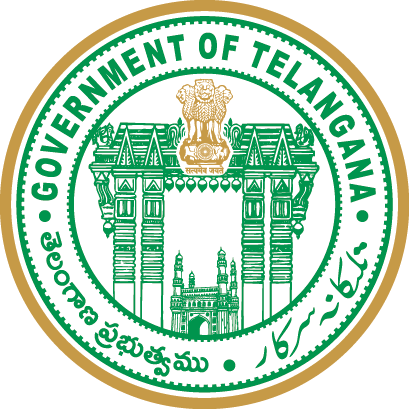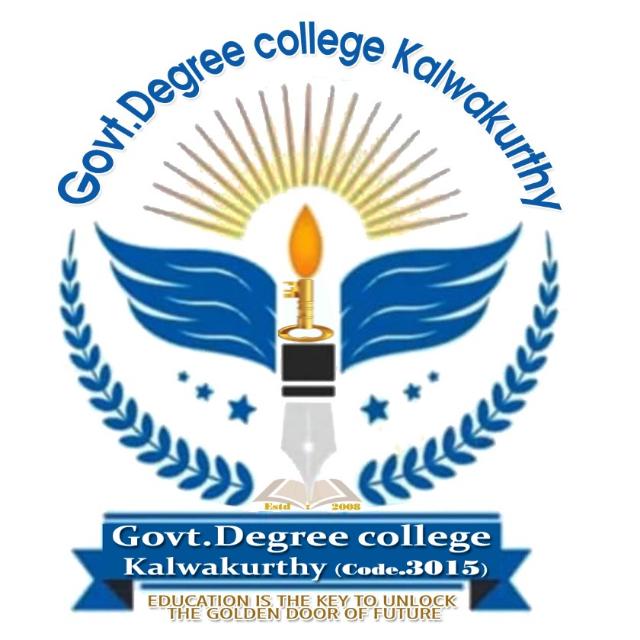Department of Zoology
About the Department:
The Department of Zoology offers Bachelor of Science (B.Sc.) degree programme as per the Palamuru University Syllabus.The department has a team of faculty members with expertise in various areas of zoology such as animal behaviour, ecology, physiology and genetics etc. It has laboratory, library, and other facilities for students toengage in research activities and for studying animals and their behaviours. Faculty and students are often shows interest in research projects related to local ecosystems and wildlife conservation. The Department of Zoology emphasizeson fieldwork and outdoor research where students have an opportunities to conduct field studies in the surrounding areas. The department involves in outreach activities, working with local communities to raise awareness about wildlife conservation and ecological sustainability. The Zoology department organizes extracurricular activities to promote an interest in zoology.The department invites guest speakers and experts to deliver lectures or conduct workshops to enhance students' knowledge and provide exposure to the latest developments in the field of zoology. The Department collaborates with local wildlife o rganizations, research institutions, and government agencies to facilitate research and conservation efforts.The department also provides career counselling and support for students interested in pursuing careers in zoology, which could include wildlife conservation, research, teaching, or related fields.
"To be a leading centre of excellence in zoological education, research, and community engagement, dedicated to understanding and conserving the biodiversity of rural Telangana and fostering a deeper appreciation for the natural world."
- To provide high-quality, holistic education in the field of zoology, equipping students with the knowledge and skills to understand, study, and conserve the rich biodiversity of Rural Telangana."
- To advance in zoological research, with a focus on the unique flora and fauna of our region. We encourage faculty and students to engage in meaningful research projects that contribute to our understanding of local ecosystems and wildlife conservation."
- To connect with and serve our local communities, through outreach, education, and collaborative projects, we aim to raise awareness about wildlife conservation, sustainable practices, and the importance of preserving our natural heritage."
- To promote a culture of environmental responsibility and ethical conduct in all our activities. We are dedicated to the conservation and protection of the fragile ecosystems in rural Telangana.
- To foster interdisciplinary collaboration with other departments and institutions, recognizing that solving complex environmental issues often requires diverse expertise and perspectives.
- To empower our students to become future leaders in zoological research and conservation. We provide opportunities for hands-on learning, critical thinking, and experiential education."
- To respect and celebrate the rich cultural heritage of Rural Telangana and its relationship with the natural world. We aim to integrate traditional knowledge and practices into our conservation efforts.
- To actively seek partnerships with governmental bodies, non-governmental organizations, and local stakeholders to collectively address environmental challenges and enhance the well-being of our region."
- To encourage global awareness by fostering an international perspective on zoology and biodiversity, promoting the exchange of knowledge and ideas.
The Department of Zoology,GDC, Kalwakurthy engages in a variety of departmental activities to fulfil its mission and provide a comprehensive education in zoology. These activities are designed to enhance the learning experience, promote research and community engagement, and contribute to the conservation and understanding of local biodiversity. Some of the department activities are as follows:
- Academic Programs:The Department offers undergraduate in zoology for Bachelor of Science (B.Sc.) to provide a strong foundation in zoological principles and practical skills.
- Research Initiatives:The Department encourages faculty and students to engage in research activities related to local wildlife and ecosystems which include conducting field studies, surveys, and research projects.
- Laboratory Work:The department has a well-equipped laboratories for practical training and research.
- Field Excursions: The department organizes field trips and excursions to local natural habitats and ecosystems, allowing students to observe and study wildlife in their natural environment.
- Guest Lectures and Seminars:The department invites experts and researchers to deliver guest lectures and seminars on various topics in zoology, conservation, and wildlife management.
- Student Research Projects:The faculty encourages and support students in conducting independent research projects, which can range from studying local animal behaviour to conducting wildlife surveys.
- Community Outreach:The faculty and students engage in community outreach activities, such as organizing wildlife awareness programs, tree-planting drives, and clean-up campaigns in local areas.
- Library and Resources:The Department has a library with books, research papers, and digital resources related to zoology and conservation.
- Invertebrates
- Vertebrates,
- Animal Physiology Animal Behaviour,
- Cell Boi Mol Bio Genetics Development Biology
- Immunology and Animal Biotechnology,
- Ecology and Evolution.
The Programme Outcomes are designed to align with the department's mission and vision and reflect the educational goals and outcomes of the Zoology program. Here are some example Programme Outcomes for such a department.
- Students will demonstrate a strong understanding of fundamental principles in zoology, including animal physiology, ecology, genetics, and taxonomy, with a focus on local biodiversity.
- Students will be able to conduct scientific research, collect and analyze data, and critically evaluate scientific literature.
- Field Skills: Students will have practical field skills, enabling them to study local fauna and ecosystems, identify species, and assess the health of wildlife populations.
- Students will be knowledgeable about local and global conservation issues, and they should be able to develop and implement conservation strategies for the region.
- Students can be capable of working collaboratively with professionals from various fields to address complex environmental challenges.
- Students should will be proficient in oral and written communication, effectively conveying scientific information to both scientific and non-scientific audiences.
- Students will possess critical thinking skills, enabling them to analyse and solve problems related to wildlife, ecosystems, and conservation.
- Students can be actively involved in community outreach, education, and awareness programs related to zoology and conservation.
- Students will have the capacity to assume leadership roles in conservation organizations and advocate for the protection of local biodiversity.
- Students will have the motivation and skills for lifelong learning and professional development, keeping up with advances in the field of zoology.
- Students will be aware of sustainable practices and promote environmental sustainability in their work and personal lives.
- Students will appreciate the global dimensions of zoology and conservation, understanding the interconnectedness of ecosystems and species worldwide.
- Students will be able to contribute to scientific knowledge by conducting original research and generating innovative solutions to zoological and conservation challenges.
Students who study zoology at the graduation can pursue a wide range of career opportunities in various sectors. Zoology is a diverse field that equips graduates with a solid understanding of animal biology, ecology, and conservation, making them well-prepared for careers in both scientific and non-scientific fields. Here are some career opportunities for graduates in zoology:
HigherEducation:
- Students can pursue the postgraduate or doctoral levelfor more specialized career paths and research opportunities.
Wildlife Conservation and Management:
- Wildlife Biologist:Study and monitor wildlife populations, habitats, and behaviors.
- Conservation Officer:Work on conserving and protecting local wildlife and ecosystems.
- Forest Range Officer: Manage and protect forested areas and wildlife within those regions.
Research and Academia:
- Research Scientist: Conduct scientific research in universities, research institutions, or government agencies.
- Academician: Become a lecturer or professor at colleges and universities, educating the next generation of zoologists.
Environmental Consultancy:
- Environmental Consultant:Assess the impact of development projects on local ecosystems and suggest mitigation strategies.
- Environmental Compliance Officer: Ensure compliance with environmental laws and regulations.
Zoos and Aquariums:
- Zookeeper:Care for and manage captive animals in zoos and wildlife sanctuaries.
- Education Specialist:Develop educational programs and materials for visitors.
Natural Resource Management:
- Natural Resource Manager: Oversee the sustainable use of natural resources in rural areas.
- Biodiversity Officer:Focus on preserving and enhancing local biodiversity.
Non-Governmental Organizations (NGOs):
- Work with wildlife and environmental NGOs on projects related to conservation, community engagement, and advocacy.
Government Agencies:
- Work with government departments such as the Forest Department, Agriculture Department, and Pollution Control Board on wildlife and environmental issues.
Laboratory and Research Facilities:
- Laboratory Technician: Assist in scientific research and data analysis.
- Field Biologist: Conduct field research and data collection in rural environments.
Science Communication and Journalism:
- Science Writer or Journalist:Communicate scientific information to the public through writing or reporting.
- Environmental Educator:Teach and create awareness about wildlife and conservation.
Pharmaceutical and Biotechnology Industries:
- Quality Control Analyst:Ensure the safety and quality of products in pharmaceutical or biotech companies.
- Research and Development:Work on developing new drugs or biotechnological products based on natural compounds.
Entrepreneurship:
- Start a business related to eco-tourism, wildlife photography, or environmental consulting services.
Museum and Heritage Conservation:
- Museum Curator:Preserve and curate natural history collections.
- Heritage Conservationist: Work on preserving natural heritage sites and artefacts.

